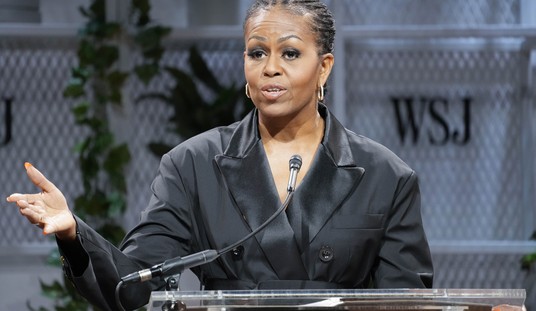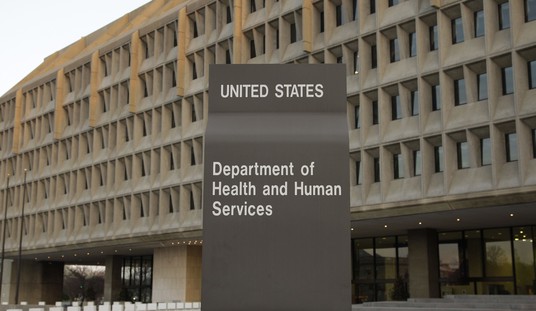Jan Crawford doesn’t say he’s the leading candidate, merely a leading candidate, but the clear implication is that Gorsuch is the surprise frontrunner. In one sense it’s no surprise at all: Gorsuch has been on Trump’s list of potential SCOTUS nominees since the beginning and was named by CNN last week as one of the six shortlisters. He’s a former Marshall Scholar, Harvard Law grad, and law clerk for, er, Anthony Kennedy. Rarely do you see a justice and his former clerk end up as colleagues on the Supreme Court, but Gorsuch’s career arc in public service has been meteoric. He joined the DOJ in 2005, was elevated as a judge to the Tenth Circuit in Colorado a year after, and now is in line for a Supreme Court appointment a little more than 10 years later. He’s all of 49 years old, five years younger than the nominal frontrunner for the Scalia vacancy, William Pryor. Put him on the Court this year and there’s a fair chance he’ll still be there in 2050.
.@JanCBS on Trump's Supreme Court nominee: I'm being told by my sources that a leading candidate is Neil Gorsuch. https://t.co/dCNY7P0alw pic.twitter.com/BxS5b3tdi6
— CBS This Morning (@CBSThisMorning) January 21, 2017
It’s worth your time to read SCOTUSblog’s profile of him. In a sea of conservative jurists aspiring to be the next Scalia, Gorsuch may be the most Scalia-esque.
With perhaps one notable area of disagreement, Judge Gorsuch’s prominent decisions bear the comparison out. For one thing, the great compliment that Gorsuch’s legal writing is in a class with Scalia’s is deserved: Gorsuch’s opinions are exceptionally clear and routinely entertaining; he is an unusual pleasure to read, and it is always plain exactly what he thinks and why. Like Scalia, Gorsuch also seems to have a set of judicial/ideological commitments apart from his personal policy preferences that drive his decision-making. He is an ardent textualist (like Scalia); he believes criminal laws should be clear and interpreted in favor of defendants even if that hurts government prosecutions (like Scalia); he is skeptical of efforts to purge religious expression from public spaces (like Scalia); he is highly dubious of legislative history (like Scalia); and he is less than enamored of the dormant commerce clause (like Scalia). In fact, some of the parallels can be downright eerie. For example, the reasoning in Gorsuch’s 2008 concurrence in United States v. Hinckley, in which he argues that one possible reading of the Sex Offender Registration and Notification Act would probably violate the rarely invoked non-delegation principle, is exactly the same as that of Scalia’s 2012 dissent in Reynolds v. United States.
Our own Ed Morrissey recently read Gorsuch’s book, “The Future of Assisted Suicide and Euthanasia,” and was impressed by the judge’s views on the sanctity of life. Interestingly, Gorsuch encountered none of the difficulties Pryor did in being confirmed as a federal appellate judge. Pryor was filibustered by Democrats repeatedly and ended up getting through the Senate only narrowly after the “Gang of 14” worked out a deal to force a floor vote. Gorsuch, by contrast, was confirmed by voice vote. I assume that’s a function of their respective paper trails to that point in their careers, though. Gorsuch had spent most of his professional life in private practice and then just a year at the DOJ before being nominated; Pryor, however, had been the attorney general of Alabama for seven years and thus had a long record of prosecutions to scrutinize. In particular, Democrats objected to an amicus brief he filed on behalf of upholding sodomy statutes in the famous Lawrence case, in which the Court — led by Gorsuch’s former boss, Anthony Kennedy — declared that such morals legislation was unconstitutional. Gorsuch isn’t getting past Senate Democrats via a voice vote this time, needless to say.
Still, he may have an easier time of it than Pryor, which makes his new status as a top contender interesting. The thinking on Pryor, or so I’ve believed, is that Democrats will resist him more ferociously than, say, they would Diane Sykes — and precisely for that reason, Pryor needs to be Trump’s first pick. Lead with the guy who’s most controversial so that, if you need to eliminate the filibuster in order to push him through, you can blame it on unthinking Democratic obstructionism of the new president. If instead Sykes is the first pick and gets confirmed easily and then Pryor is the second nominee and meets fierce resistance, Dems can point to their earlier acquiescence on Sykes as proof that they’re not filibustering mindlessly. Pryor really is an “extremist,” they’ll say, who requires an extreme response. By the same logic, if Gorsuch is the first nominee and gets confirmed, it arguably makes it harder for Trump to nominate Pryor later. (It’d also be surprising if Pryor was made to wait given that his mentor, Jeff Sessions, is Trump’s right-hand man at DOJ.) Maybe, though, the White House has calculated that Democrats will filibuster the first pick no matter who it is, in which case they’re better off leading with someone like Gorsuch who’s harder for the left to demonize than Pryor is. Gorsuch is from a purple state, Colorado; Pryor is from the deep south. There’s no Lawrence-style ammo against Gorsuch as there is for Pryor. Democrats will have a harder sell convincing the public that Gorsuch is an “extremist,” but if they end up filibustering anyway — as their base will probably demand — that’ll give McConnell a reason to eliminate the filibuster on more favorable political terrain. And once the filibuster’s gone for Gorsuch, it’s gone for Pryor too. He could be offered as the second nominee and meet no meaningful resistance.
Interesting strategic options all around. Here’s a look at Gorsuch from a lecture delivered to the Federalist Society a few years ago. One thing I can’t help noticing is that he “looks the part,” straight out of central casting for a judge. (He looks older than his 49 years old.) You may not care about that, but Trump does.








Join the conversation as a VIP Member